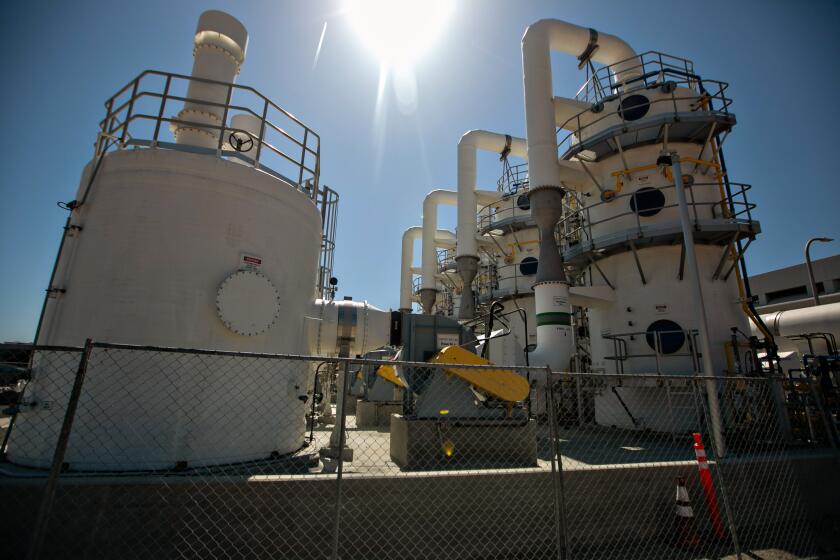In Arab World, Palestinian Plight Eclipses Afghanistan
Like everywhere else, people here are raptly watching the battle scenes and military strikes that flash across their television screens.
But it’s not the craggy mountains of Afghanistan they see; it’s the streets of the West Bank and Gaza Strip.
Even as attacks intensify against Osama bin Laden’s adopted home, attention in the Arab world has shifted to the unraveling situation in the Palestinian territories.
“Arabs are much more connected--historically, culturally, emotionally--to what’s going on in Palestine right now,” said Emad Shahin, a Cairo professor. “Afghanistan is a question of harming people we feel are innocent, and there’s much concern about that. But Palestine--this is totally different. As the situation gets out of control, we can’t take our minds off it.”
Arab Leaders Pulled Further Into Conflict
The escalating conflict between Israel and the Palestinians comes at a horrible time for the United States, which is trying to muster Arab support for strikes against suspected terrorists. Reinvigorated anger toward Israel could nullify any existing support for the campaign.
As the days pass, Arab leaders find themselves increasingly drawn into the Palestinian conflict, which is at its nadir after more than a year of fighting.
On Saturday, Saudi Foreign Minister Prince Saud al Faisal flew across the Red Sea to meet with Egyptian President Hosni Mubarak to discuss what could be done. The same morning, a convoy of Israeli tanks rumbled into another West Bank village.
The day before, Egypt’s foreign minister, Ahmed Maher, issued a statement saying Israeli policies were “extremely dangerous and will lead nowhere.”
Arab League Secretary-General Amr Moussa also spoke out, pressing the international community “to act rapidly and in concrete terms to prevent Israel from persisting with the policy of assassinations.”
It’s not that people in Cairo or other Arab cities have become numb to the nightly pounding of Afghanistan.
“American aggression is wrong” is one common refrain. “The U.S. shouldn’t interfere in another country’s business” is another.
But anti-American sentiment has not exploded in the Middle East, at least not yet.
Unlike in Malaysia, Indonesia and Pakistan, where police have battled violent demonstrators, no protests have raged in this slice of the Muslim world. Arab capitals--from Cairo to Riyadh in Saudi Arabia, Damascus in Syria and Tripoli in Libya--have been quiet, save for an occasional student gathering against the U.S.-led military action in Afghanistan.
But the deepening Israeli-Palestinian conflict could disrupt all that. For many people, the issues are linked. As newscasters show more shots of Palestinian boys being wheeled into morgues, as the stymied Israeli-Palestinian peace process evaporates, many Arabs are becoming increasingly bitter toward the United States, historically Israel’s closest ally.
Many say the United States should pressure Israel to make more concessions and grant the occupied territories independence.
“There is such a double standard toward Israel and how it treats the Palestinians,” said Essam Erian, an Egyptian doctor. “This hypocrisy is exactly why people are turning against the U.S.”
U.S. Hopes to Gain Rights to Airspace
Over the last two days, Israeli troops have moved into several West Bank towns in the broadest military operation since the intifada was launched last fall. The latest cycle of violence was set off last week when Palestinian militants assassinated Rehavam Zeevi, Israel’s ultranationalist tourism minister.
In such a charged atmosphere, Arab leaders can do only so much for Israel’s top benefactor. The United States is depending on several nations in the region for use of their airspace and is asking countries to share counter-terrorism intelligence.
Western leaders have even reached out to the Arab people directly, with Defense Secretary Donald H. Rumsfeld and British Prime Minister Tony Blair appearing on Arabic TV network Al Jazeera this week.
It’s not clear how much it has helped. Saudi Arabia continues to deny the United States permission to launch airstrikes from its soil, despite the fact that thousands of U.S. soldiers are stationed in the kingdom.
Egypt could never let America use bases, either, said Mustafa Feqi, a senior member of the People’s Assembly, or parliament.
“Foreign bases would be a provocation against fundamentalists,” he said. “It would open a door that could never be closed.”
2 Nations Balk at Cooperation With U.S.
Last week, the two countries refused to cooperate with American efforts to identify terrorism suspects flying into the United States. Ninety-four airlines agreed to help, but Saudi Arabian Airlines and Egypt Air were among a handful refusing to provide passenger lists.
“Hundreds of Saudi citizens are being detained and questioned with regard to the hijackings,” said a Saudi Embassy spokesman in Washington. “That number would probably quadruple if we shared advance information on air passengers with the United States.”
When the strikes began two weeks ago, many Arabs were concerned that the United States would expand its attacks to Iraq, Syria and Libya, which are thought to harbor terrorists. As time has passed, some of those fears have faded.
But what hasn’t is the conviction that terrorism won’t stop until there’s peace in the Holy Land. This is essentially what Bin Laden, suspected of masterminding the attacks on America, said in a statement broadcast after the military action in Afghanistan began.
“If you kill Bin Laden but don’t address the causes, Bin Laden will rise again,” said Erian, the Egyptian doctor. “This is common sense, isn’t it?”
More to Read
Start your day right
Sign up for Essential California for news, features and recommendations from the L.A. Times and beyond in your inbox six days a week.
You may occasionally receive promotional content from the Los Angeles Times.






